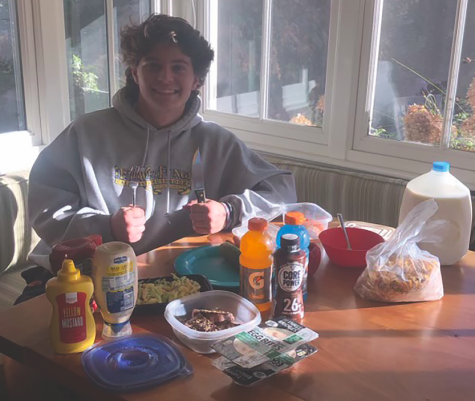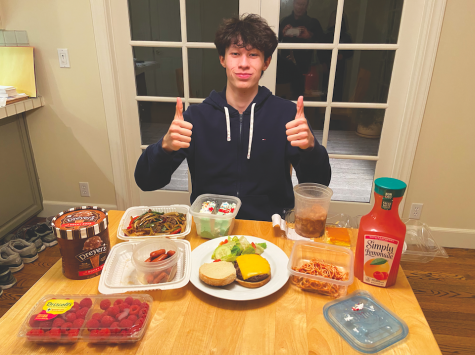Swimming is a sport that takes tremendous athletic ability. It uses muscles you never even knew existed and pushes them to the max. With massive outputs of athletic performance, one needs massive amounts of fuel. A car cannot run without gas right? That is why Michael Phelps, the 23 time Olympic gold medalist, recalls spending half of his day eating. During his 2008 run, he stated that he was eating around 12,000 calories a day! Which is close to five times the amount of a normal adult male at 2,500 calories. Phelps needs this to fuel his training and competition, as swimming is such a grueling sport. Countless people on social media have tried to complete the Phelps Calorie challenge and most have failed. To see how hard this act really is, three brave Viking staff members, Jack Elarde (‘21), Josh Butler (‘22), and Justin Byer (‘21), will take on this challenge to see how they stack up against the legendary Olympic athlete.
Justin Byer:
When the summer started, I felt as if I hadn’t been gaining any weight, feeling unmotivated to get out of bed and get something to eat, along with getting out of bed in general. My family put in a home gym that I had started using, which made me start to feel better about my physical and mental health. My friend and I had talked about having weight goals for the beginning and end of summer. My goal was to gain 20 lbs over the summer and with enough dedication, and motivation from my peers, I was able to complete the mission I had set out for. Being able to try and successfully complete this 12,000 calorie challenge was a big task, as if I had to eat a full course meal almost every hour along with multiple snacks in between.
My plan was to stop eating the night before the challenge so that I would be extremely hungry when I woke up. I started my day with 10 eggs (with ketchup —obviously), toast with peanut butter and honey, a protein bar and loaded protein shake. This held me over until lunch, where I consumed a triple cheeseburger and chocolate milkshake at In-N-Out. By the end of lunch, I was already on track for 5,000 calories consumed. One aspect of the challenge that was tough for me was that I am typically the type of person that tends to eat more snacks than meals throughout the day, but for this challenge I had to mix my strategy. When a lot of people typically try these types of challenges, they would stuff their face every meal, making it hard to keep consuming, force feeding themselves. Burning off calories throughout the challenge made it easier on my stomach, whether that was by weightlifting or playing basketball. By the afternoon, I had eaten as much as I would on a normal day. I had told my girlfriend about this challenge and she insisted on helping me succeed, constantly putting food in front of me, making food for me and rooting for me to go eat more. I ended up eating 3 more meals that were approximately 1,500 calories each, with many more snacks to come. Towards the end of the night, I was stuck in a food coma, with regrets flowing through my head, and stomach aches coming and going. I ended the challenge consuming 8,500 calories—which for me is a huge number of calories, considering that I only weigh 170 lbs.
Josh Butler:
Every day for the past eight months I have been trying to eat as much food as I can in order to gain weight for football. My totals run at about 8,000 calories a day, which is no joke. I struggle to eat that many calories a day and when I say struggle, it is a struggle. Before I talk about my experience, I would just like to give a huge deal of respect to Mr. Phelps. Coming from another athlete who tries to eat a lot of food, try eating 4,000 calories and see what happens. Then imagine eating three times that amount.

Jack Elarde:

